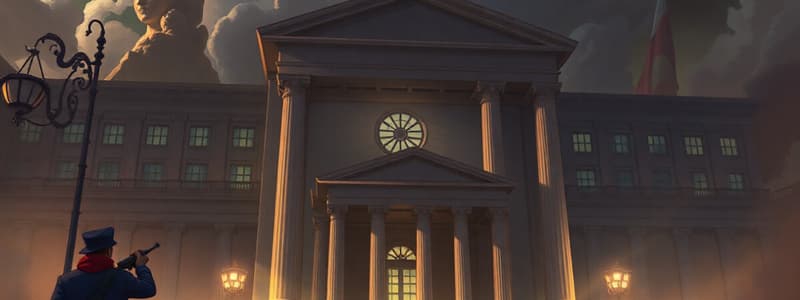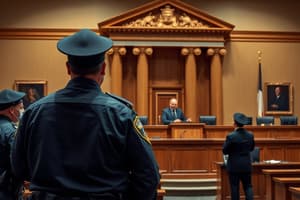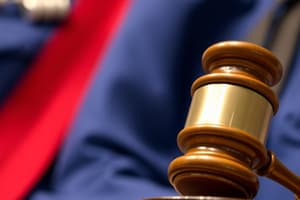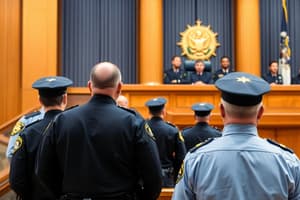Podcast
Questions and Answers
Within the U.S. criminal justice system, which level of government possesses its own sovereign criminal justice system?
Within the U.S. criminal justice system, which level of government possesses its own sovereign criminal justice system?
- Municipal and county governments
- Federal, state, and tribal governments (correct)
- State governments only
- Federal government only
Which component of the criminal justice system is primarily responsible for the administration of sanctions and sentences handed down by the courts?
Which component of the criminal justice system is primarily responsible for the administration of sanctions and sentences handed down by the courts?
- Legislative branch
- Corrections system (correct)
- Judicial system
- Law enforcement
In Nevada's court system, which court(s) have limited jurisdiction, primarily handling misdemeanor cases, traffic violations, and small claims?
In Nevada's court system, which court(s) have limited jurisdiction, primarily handling misdemeanor cases, traffic violations, and small claims?
- District Courts
- Justice Courts and Municipal Courts (correct)
- Supreme Court
- Court of Appeals
In the context of the U.S. legal system, what is the unique constraint on federal courts when interpreting laws?
In the context of the U.S. legal system, what is the unique constraint on federal courts when interpreting laws?
What principle ensures that government officers cannot exceed their authority in a criminal justice system based on the 'rule of law'?
What principle ensures that government officers cannot exceed their authority in a criminal justice system based on the 'rule of law'?
Flashcards
Legislative Component
Legislative Component
The legislative component develops legislative proposals, legal memoranda, writes laws, and prepares Congressional testimony.
Law Enforcement Role
Law Enforcement Role
The law enforcement function is perhaps the most visible. Police officers are typically the first contact a criminal has with the system.
Judicial System Function
Judicial System Function
Main function involves adjudication (trying crimes) of cases to fairly determine guilt or innocence and the proper sentencing of those found guilty.
Corrections System Function
Corrections System Function
Signup and view all the flashcards
State Court
State Court
Signup and view all the flashcards
Study Notes
- The course is titled "Systems of Criminal Justice."
- NAC reference numbers for the course are 289.140 (6b) and 289.150 (6b), both categorized under "Misc. Subjects."
- The course is 4 hours in length.
- The target audience is Lander County Sheriff’s Office Detention Division Deputy Trainees.
- The instructor is Lander County Sheriff’s Office Training Staff.
- The method of instruction is lecture, supplemented with handouts and PowerPoint.
- The lesson was revised on August 17, 2020.
- There are three "sovereigns" of criminal justice systems in the United States: federal, state, and tribal governments.
Student Performance Objectives
- Students will be able to discuss the functions and responsibilities of legislative bodies, law enforcement, judicial systems, and corrections.
- Students will also be able to describe the state, federal, and tribal court systems.
- Definition of a system: An assemblage of inter-related elements comprising a unified whole.
- Definition of a criminal justice system: An elaborate apparatus that exists to oversee the enforcement of criminal laws.
Components of the Criminal Justice System
- The legislative component develops legislative proposals, legal memoranda, writes laws, and prepares Congressional testimony, and prepares comments on pending legislation affecting the criminal justice system.
- Law enforcement is often the most visible part of the system; they patrol, prevent crimes, investigate incidents, and arrest suspects.
- The judicial system's main function is the adjudication of cases to determine guilt or innocence and sentencing.
- The corrections system administers sanctions handed down by the court, ranging from fines to imprisonment.
State Court
- State courts decide cases involving state law or the state constitution, divided by the dollar amount of claims.
- Civil Cases:
- Private parties file these cases.
- Punishment involves reimbursement for loss, punitive damages, or fines.
- The plaintiff must prove their case by a preponderance of the evidence.
- Criminal Cases:
- Government files these cases.
- Punishment involves incarceration.
- The state must prove guilt beyond a reasonable doubt.
Trials
- The Justice Court Rule of Civil Procedure ("JCRCP") preserves the right to a trial by jury.
- Parties can demand a jury trial by filing a written demand with the other parties.
- Issues not demanded for trial by jury are tried by the court in bench trials.
District Courts
- District Courts have general jurisdiction over all legal disputes, generally resolved through arbitration, mediation, and bench or jury trials.
- Nevada has 11 judicial districts with 82 District Court judges.
Justice Courts
- Nevada's Justice Courts handle matters detailed in Nevada Revised Statutes.
- The 67 Justices of the Peace determine if felony or gross misdemeanor cases have enough evidence to be bound over to a District Court for trial, and presides over non-traffic misdemeanor, small claims, summary eviction, temporary protection, and traffic cases.
- NRS 4.370 limits the jurisdiction of the Justice Courts to civil actions not exceeding $10,000, small claims not exceeding $7,500, or cases of landlord/tenant.
Municipal Court
- Municipal Court judges hear violations of city ordinance, non-traffic misdemeanors, traffic violations, and parking violations; it also hears some civil matters, such as unpaid utility bills.
- There are 30 Municipal Courts.
Supreme Court
- Nevada’s highest court has the primary responsibility to review and rule on appeals from District Court cases.
- It determines if legal or procedural errors were committed, but does not conduct fact-finding trials.
Court of Appeals
- The three judges of the Court of Appeals hear roughly one-third of cases in a deflective model.
- Supreme Court review of Court of Appeals decisions is discretionary.
Federal Courts
- Federal courts have jurisdiction over civil actions and criminal cases dealing with federal law, but certain cases can be heard in either federal or state court.
- Federal courts can only interpret the law when deciding a dispute.
- The Constitution grants Congress power to create and abolish federal courts, with the exception of the U.S. Supreme Court which cannot be abolished.
Tribal Courts
- Tribal courts and justice systems established by American Indian and Alaska Native tribes are critical components of the tribal government, resolving conflict and controversy.
- Tribal courts have broad criminal jurisdiction, and states generally have no jurisdiction over Indian activities in Indian country.
- Justice systems are diverse, ranging from elaborate to developing, and may use adversarial processes or traditional dispute resolution methods.
- "Courts of Indian Offenses" or "CFR Courts" were the first modern iteration of tribal courts, established by the Department of the Interior in 1883 to handle less serious criminal actions and resolve disputes among tribal members.
- The Indian Reorganization Act of 1934 allowed Indian tribes to establish their own justice codes and operate court systems.
Rule of Law
- The criminal justice system is based on the “rule of law," a political and legal principle.
- Government must act in accordance with established law.
- Government officers must not exceed their authority.
- The 10th amendment of the U.S. Constitution grants legal authority for local law enforcement, reserving powers not delegated to the states by the constitution.
Studying That Suits You
Use AI to generate personalized quizzes and flashcards to suit your learning preferences.




